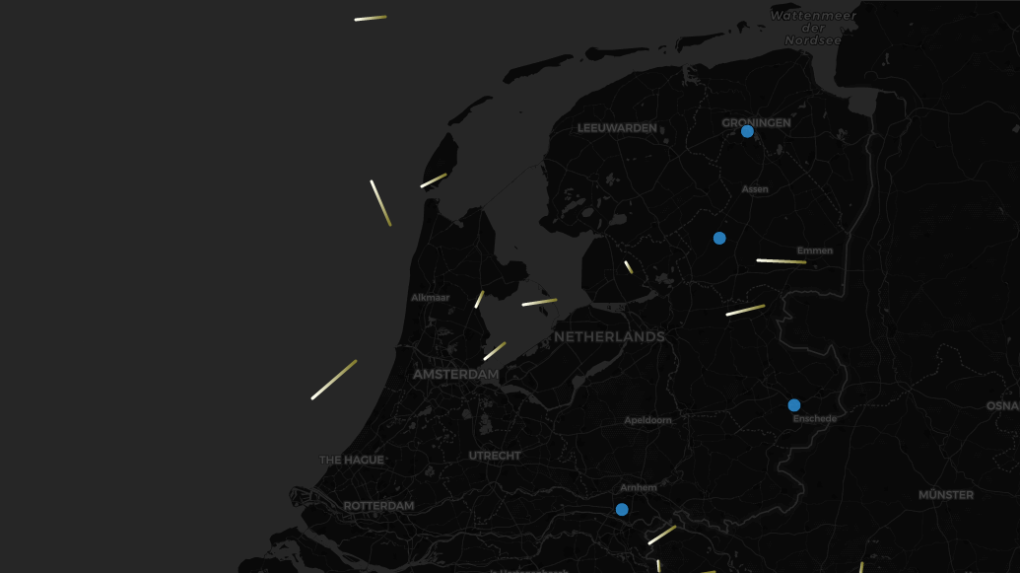Global push to monitor meteor showers led by Western University in London, Ont.
 A map shows the location and direction of meteors as well as the location of meteor cameras (blue) in this data from the Global Meteor Network for Monday, July 26, 2021.
A map shows the location and direction of meteors as well as the location of meteor cameras (blue) in this data from the Global Meteor Network for Monday, July 26, 2021.
London, Ont.'s Western University is leading a worldwide effort to monitor meteor showers and meteorite falls.
The Global Meteor Network (GMN) includes more than 450 cameras in 23 countries - hosted by amateur and professional astronomers.
The goal of the project, led by Denis Vida, a postdoctoral associate at Western, is to ensure unique or rare space events are not missed.
Vida explained in a statement, “Other astronomers can pool their resources to build a big telescope on top of a mountain where the skies are dark and clear year-round, but meteor astronomers need spatial coverage most of all."
Meteors can occur anywhere in the world, happen close to earth and often burn up at around 100 km above the surface -- so they can only be well observed from within about 300 km and need to be seen by cameras in at least two places to get the exact location.
That's where the Global Meteor Network comes in.
In March, the network helped locate a rare portion of a meteorite that landed in Winchcombe, England on Feb. 28 and figure out where in space it originated.
“Its role in the recovery and analysis of the Winchcombe meteorite fall is proof positive that GMN works,” said Vida.
The first system to observe meteorites was installed at Western in 2017, and it continues to grow as the cost of meteor cameras has declined.
GMN also publishes the orbits of all observed meteors around the world within 24 hours of observation. The location of cameras and meteor data can be seen here.
The network also hopes to better understand flight patterns and flux capacities of meteorites, and even predict future events.
CTVNews.ca Top Stories

Former B.C. premier John Horgan dies at 65
Former B.C. premier John Horgan, who helped the provincial NDP return to power after 16 years on the sidelines, has died.
History in Halifax is slowly being wiped off the map: study
Saint Mary's University archeologist Jonathan Fowler is sounding an alarm with a new study. According to Fowler, the centuries-old architecture that adds to Halifax’s heritage and historic vibe is slowly being wiped away as the city grows.
Here's why thieves may be stealing butter in Canada
The case of the missing butter remains a mystery, but some have ideas on what's behind the unusual crimes.
Body found in Montreal park identified as cryptocurrency influencer
The body of a man that was found in a park in the Ahunstic-Cartierville borough last month has been identified as cryptocurrency influencer Kevin Mirshahi.
B.C. teen with Canada's first human case of avian flu in critical condition, Dr. Bonnie Henry says
The teenager who is sick with the first-ever human case of avian influenza acquired in Canada is in hospital in critical condition, provincial health officer Dr. Bonnie Henry said Tuesday.
2-year-old gorilla 'Eyare' dies unexpectedly at Calgary Zoo
A young gorilla at the Calgary Zoo has died. The Wilder Institute/Calgary Zoo announced a member of its western lowland gorilla troop passed away unexpectedly, in a news release Tuesday.
KFC sues Church's Chicken over 'Original Recipe'
KFC accused Church's Texas Chicken of violating its trademark rights when its fried chicken competitor began using the words 'Original Recipe' in its advertising and promotions.
Ottawa high school principal apologizes for song played during Remembrance Day assembly
The principal of an Ottawa high school is apologizing to students, parents and guardians after an Arabic-language song was played during the school's Remembrance Day service. The Ottawa-Carleton District School Board is conducting a "thorough investigation" to ensure it "is addressed appropriately and meaningfully."
Union says it will challenge Ottawa's intervention in B.C. port work stoppages
The union representing locked-out port workers in British Columbia says it plans to challenge the federal government's intervention in the ongoing labour dispute.

































